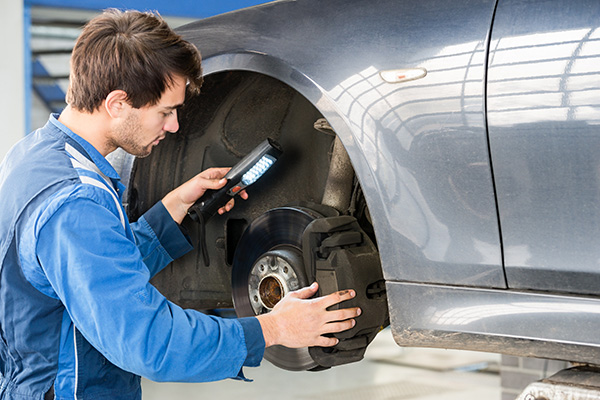
Do you hear a high-pitched squeak when you press on the brake pedal? It’s not just annoying. It can leave you wondering if something’s wrong with your brakes. Brake squeaking is a common problem that can stem from several causes, and while it’s not always a sign of impending brake failure, it’s definitely something you shouldn’t ignore. So, what can you do to get rid of that squeak once and for all?
Squeaking Brakes
Several factors can contribute to squeaky brakes, ranging from harmless to serious:
Worn Brake Pads
The most common reason for brake squeaking is worn-out brake pads. Many brake pads come with a small metal indicator that starts to make a squealing noise when the pads are getting thin. This is essentially an early warning system to let you know it’s time to replace them.
Dust and Debris
Dust, dirt, and grime can accumulate on your brake components, leading to squeaking. When the brakes engage, these particles can get caught between the pads and the rotor, causing that irritating sound.
Moisture
If you notice your brakes squeaking first thing in the morning or after a rainstorm, it could be due to moisture. Water can temporarily cause a thin layer of rust to form on the rotors, and when the pads press against them, it can produce a squeak. This issue usually goes away after a few stops.
Glazed Pads and Rotors
If your brakes have overheated—perhaps from hard or repeated braking—the pads and rotors can become "glazed." This is when the surface of the brake pad becomes smooth and shiny, which can lead to squeaking and reduced braking performance.
Loose Parts
Sometimes, the hardware that holds your brake pads and calipers in place can become loose. This can cause your brakes to vibrate when applied, resulting in a squeaking sound.
How to Stop Brake Squeaking
Replace Worn Brake Pads
If your brake pads are nearing the end of their life, replacing them is the most straightforward fix. As mentioned earlier, many brake pads come with built-in wear indicators that squeak to let you know they’re ready to be swapped out. Don’t wait until the squeaking turns into grinding—that's a sign that the pads are completely worn and metal is rubbing against metal, which can damage your rotors and lead to expensive repairs.
When selecting new brake pads, consider upgrading to high-quality pads made from ceramic or semi-metallic materials. These tend to be quieter and more durable than standard pads.
Clean Brake Components
Sometimes, all your brakes need is a good cleaning. Dust, dirt, and even rust can build up on your brake components, leading to that irritating squeak. To clean your brakes, you’ll need to remove the wheel and use a brake cleaner to spray down the pads, rotors, and calipers. Brake cleaner is designed to remove debris without leaving a residue, so it’s perfect for this job. Be sure to let everything dry before reassembling the wheel and driving off.
Resurface or Replace Rotors
If your rotors are worn, warped, or glazed, they might be the culprit behind the squeaking. When the rotor surface isn’t smooth, it can cause uneven contact with the brake pads, leading to noise. In this case, you may need to have your rotors resurfaced, which involves shaving a thin layer off to create a smooth, even surface.
If the rotors are too thin or damaged, resurfacing may not be enough, and you’ll need to replace them entirely. While this is a more expensive solution, it will eliminate the noise and improve braking performance.
Is Brake Squeaking Dangerous?
Not all brake squeaks are cause for immediate concern, but they should never be ignored. If worn brake pads or damaged rotors cause noise, your braking performance could be compromised, making it harder to stop in an emergency. Even if the squeaking is due to something minor like dirt or moisture, it’s still a good idea to address it to avoid more serious issues down the line.
Tired of your brakes squeaking? Stop guessing and let the professionals at Village Transmission & Auto Clinic take care of it. Our expert technicians will inspect your brakes, pinpoint the problem, and get you back on the road safely. Schedule your brake inspection today!